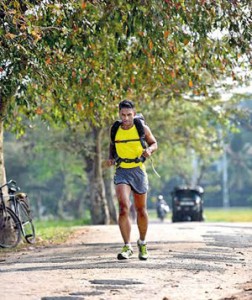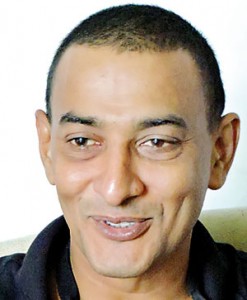All set for their desert adventure

Serious training: Shihan Anthony John
They will only carry what they cannot live without, and what they cannot live without shouldn’t weigh more than 13kgs. Clothes, sleeping bags, assorted equipment, first aid kits, and seven days of food – it’s the bare minimum that Ruvan Ranatunga and Shihan Anthony John need to face the Atacama Desert in Chile. They will cross it on foot, pitting body and soul against a harsh landscape that has been compared to the surface of Mars.
Widely considered the most challenging of the four Deserts Races organised by Racing The Planet, the Atacama Crossing is an annual event along with the Sahara Race, the Gobi March, and the ‘Last Desert’ in Antarctica. Ruvan and Shihan are reportedly the first Sri Lankans to attempt a 4 Desert challenge.
The race, which takes runners through some 250km of the Atacama in seven days, is accomplished in six stages. They will cover 40km a day over the first four days, and then follow that with a 74km stretch, a rest day, and the final 11km-push before the finish line, all at an elevation of 3,500m-2,400m above sea-level. The race is self-supported, and organisers only provide water, and a tent at night, when temperatures are expected to drop to 5°C.
Ruvan who is the proprietor of the gear and training outfit Adventure SEALs, is perhaps best known as the man who walked across Sri Lanka and raised Rs. 4.4 million for cancer treatment in 2013. A decade younger, Shihan is an amateur athlete with a penchant for pushing himself to the very limit. He was at Racing The Planet’s ninth Roving Race in Sri Lanka this February, and finished a multi-day run that extended from Nuwara Eliya to Yala. The men have a lot in common: they share a deep love for the outdoors, have both served in the Armed Forces–Ruvan is a former Major in the Army, while Shihan was a Flying Officer in the Air Force – and they are both on intimate terms with pain.
“It changes you as a person,” says Shihan. “You can rely on your physical ability for the first 40km, for the first day, but anything beyond that and it becomes about the mental challenge. You have to be prepared. You have to embrace the pain, and let it motivate you.”
Growing up, Shihan says he was a sickly child. He didn’t excel in sports in school and it wasn’t until he signed up to serve his country that he was forced to become fit as part of the training regimen. What started out as a chore soon became a pleasure and even after he had left the Air Force behind he kept running. Today, he routinely starts his day at 3.30 a.m. – enough time to fit in a run before he clocks into his day job at MAS at 8 a.m. Shihan says he loves running, and that ultra-marathons tend to stand out among other competitive races for their unique spirit – “The recognition the first and the last runner achieves is the same, it’s about finishing the event.”
Shihan’s determination and passion really rang a chord with Ruvan when the two met at Adventure SEALs prior to a running event. “Shihan started it all, he really got the ball rolling,” says Ruvan. Shihan even convinced Ruvan’s wife Meneka that the Atacama Crossing was a good idea. Says Ruvan: “It’s amazing when someone who just randomly walks in to the store inspires you to do something. The dream is so strong, and we just gelled and decided to do this.”

Ruvan Ranatunga
The two men are perfectly matched – Ruvan has all the technical expertise required to choose the right equipment, clothing and food (the last made more complicated by Shihan being a vegan), while Shihan has the physical know-how needed to run an ultra-marathon. Competing with them will be 160 participants from 40 countries.
The two men have heard that those who drop out of the race tend to do so primarily because of serious dehydration and blisters. You’re also likely to lose weight on the run, but lose too much and the organizers will pull you out. “When you are looking at a multi-day run like this, it’s a whole new ballgame,” says Ruvan, explaining that the Atacama is one of the coldest deserts in the world, and the air is so dry it sucks the moisture right out of your body. In particular, they intend to lavish every attention on their feet and to keep them dry – but then again, on day two they will be running through 8km of saltwater, so a few blisters seem inevitable.
Another hurdle they face is the entry fee, a whopping $3,800 for every 4 Desert Race. Ruvan and Shihan’s families and friends have come together to fund their participation in this event. That frees them up to raise funds for Trail to support cancer treatment in Sri Lanka. This year Trail’s walk is dedicated to building a specialised oncology treatment and research centre for the Karapitiya Hospital in Galle, and will kick off just as the two men finish the crossing.
But this isn’t the end of their ambition. The Atacama Crossing runs from October 2 – 8, and they intend to fly back and begin training immediately for the Hong Kong 100km marathon in December. Next year, they hope to return and complete a 4 Desert ‘Grand Slam’, joining an elite group of 48 ultra-marathon runners who have taken on not just the Atacama, but the Gobi, the Sahara and Antarctica. Taken together, that’s about 1000 km of enduring some of the most demanding and hostile environments on the planet – Ruvan can barely contain his enthusiasm.
“For me it’s about getting to really live life, rather than just pass through it. I think we are all increasingly getting caught up in the rat race. We postpone following up on our dreams, thinking we’ll do it next year or the year after and then we find we can’t,” says Ruvan.“You have to create opportunities. For me if there is something challenging, something new, something rewarding, I would keep doing it, this year, next year and every year after.”
You can find out details on how to donate to trail online here: trailsl.com, and follow Ruvan and Shihan’s journey on Facebook.


